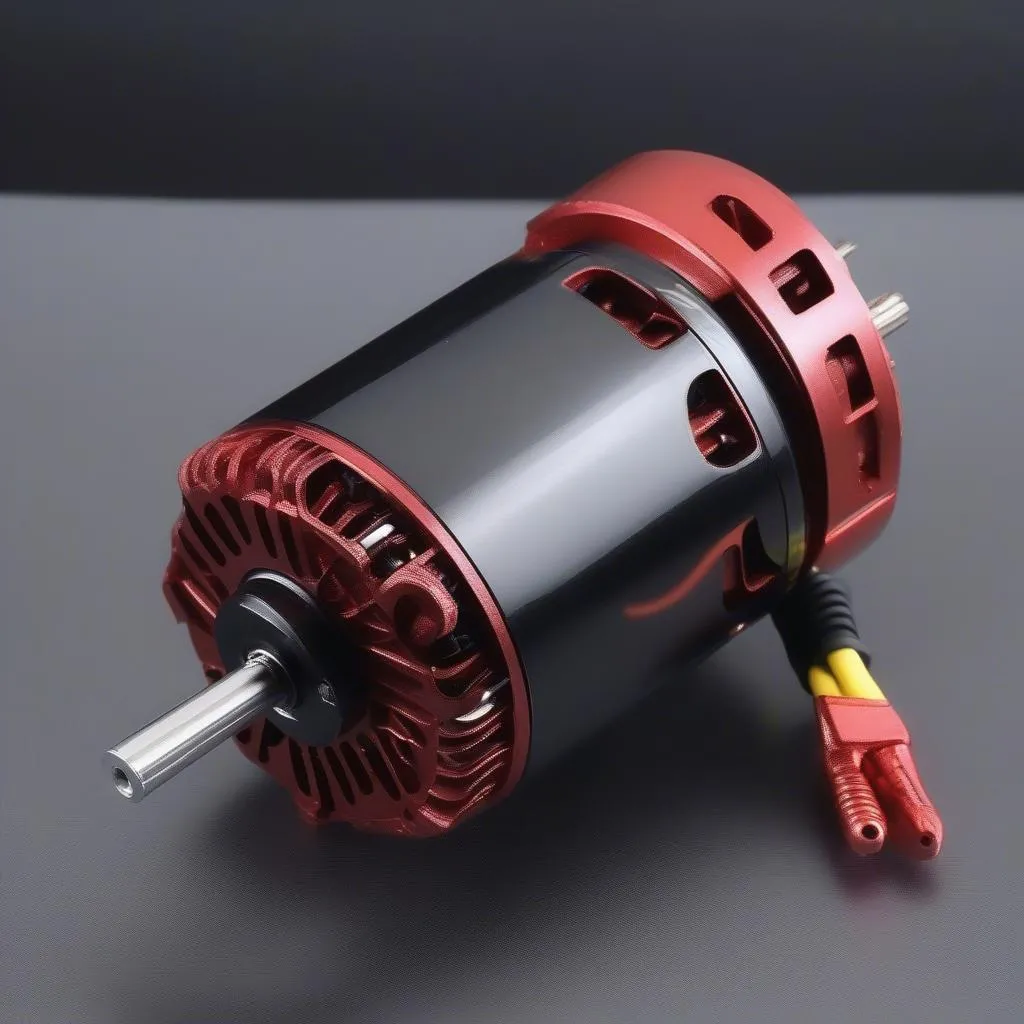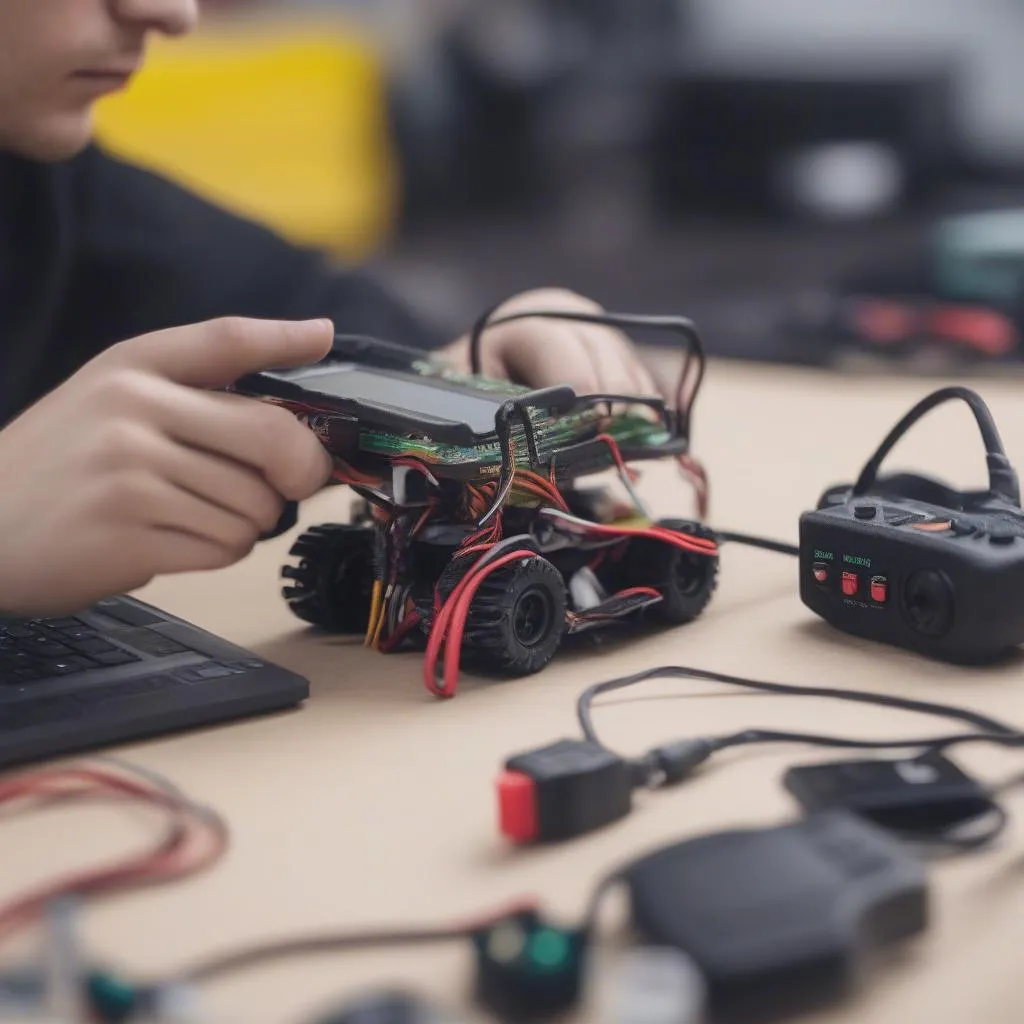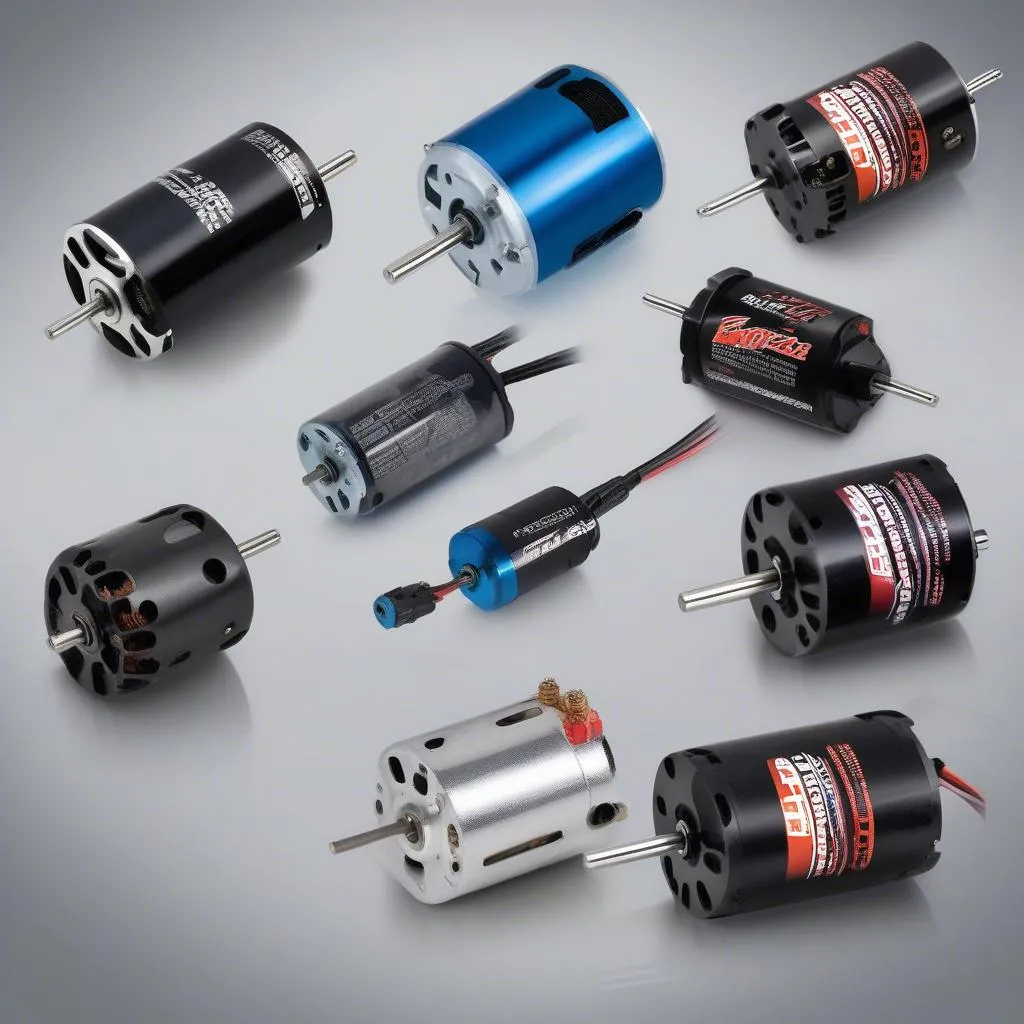Have you ever been captivated by the incredible speed and agility of a high-performance remote control car? Chances are, you’ve witnessed the power of a brushless motor in action. These motors are revolutionizing the RC car industry, offering unparalleled performance and efficiency. But what exactly are brushless motors, and how do they work?
Let’s dive into the world of Remote Control Car Brushless Motors and explore everything you need to know about these powerful little machines.
Understanding the Importance of Brushless Motors
Brushless motors are the heart of many modern remote control cars. They’re known for their exceptional power-to-weight ratio, high efficiency, and long lifespan. Unlike brushed motors, they don’t use brushes to generate electricity, eliminating friction and wear. This means you get more speed, longer runtime, and less maintenance.
Why Choose a Brushless Motor for Your RC Car?
- Increased Speed and Torque: Brushless motors can generate significantly higher speeds and torque compared to brushed motors. This means your RC car will be faster, more responsive, and capable of handling challenging terrains.
- Enhanced Efficiency: Due to the absence of friction from brushes, brushless motors are incredibly efficient, using less energy and providing longer runtime. This means you can enjoy more playtime on a single charge.
- Reduced Maintenance: Brushless motors are highly durable and require minimal maintenance. Unlike brushed motors that require regular cleaning and brush replacement, brushless motors offer a virtually maintenance-free experience.
- Extended Lifespan: The absence of friction and wear extends the lifespan of brushless motors significantly compared to brushed motors. You can expect your brushless motor to last much longer, making it a great investment.
Diving Deeper: The Technical Aspects of Brushless Motors
What Makes a Brushless Motor Tick?
A brushless motor consists of three main components: a stator, a rotor, and an electronic speed controller (ESC).
- Stator: The stator is the stationary part of the motor and houses electromagnets that create a rotating magnetic field.
- Rotor: The rotor is the rotating part of the motor and contains permanent magnets. These magnets interact with the magnetic field generated by the stator, causing the rotor to spin.
- ESC: The electronic speed controller (ESC) is the brains of the operation. It receives signals from your remote control and sends electrical pulses to the stator windings, controlling the motor’s speed and direction.
How does a Brushless Motor Work?
The magic of a brushless motor lies in the interaction between the stator’s magnetic field and the rotor’s permanent magnets. The ESC controls the magnetic field generated by the stator, causing the rotor to spin continuously.
Imagine the stator’s magnetic field as a series of magnets rotating around the rotor. The rotor, with its permanent magnets, aligns itself with the rotating magnetic field, causing it to turn. The ESC’s job is to precisely control the timing and strength of the magnetic field to achieve desired speed and direction.
The Benefits of Brushless Motors in Remote Control Cars
Unmatched Performance:
Imagine zipping through the dirt track at lightning speed, effortlessly navigating sharp corners and challenging obstacles. Brushless motors are the key to achieving this kind of performance.
Example: Think about the top-tier RC cars used in professional racing. They’re powered by brushless motors that allow them to reach speeds exceeding 50 miles per hour!
Longer Runtimes:
No one likes seeing their RC car come to a standstill in the middle of a race because the battery died. Brushless motors address this issue by utilizing power more efficiently, providing longer runtimes and more playtime.
Example: Imagine spending an entire afternoon racing your RC car without worrying about battery life. That’s the kind of experience brushless motors offer.
Reduced Maintenance:
Less time spent on maintenance means more time spent racing. Brushless motors are remarkably durable and require less upkeep compared to brushed motors.
Example: While a brushed motor may require regular cleaning, brush replacement, and even occasional motor repairs, a brushless motor might only need occasional lubrication or a quick cleaning.
Enhanced Durability:
Brushless motors are known for their durability and ability to withstand demanding conditions. This makes them ideal for RC cars that endure rough terrain, high speeds, and frequent impacts.
Example: Think about RC cars that are designed for off-road adventures. These vehicles require robust motors that can handle the stress of jumps, bumps, and rocks. Brushless motors excel in these challenging environments.
Choosing the Right Brushless Motor for Your RC Car
The right brushless motor for your RC car depends on a few key factors:
- Vehicle Type: Consider the size and weight of your RC car. A powerful motor is ideal for large, heavy vehicles, while a smaller, lighter motor might be suitable for smaller, nimble RC cars.
- Desired Performance: Determine your desired performance level. If you’re looking for maximum speed and agility, you’ll need a high-performance motor with a high kV rating. For smoother, controlled performance, a lower kV motor might be a better choice.
- Battery Capacity: Consider the battery capacity of your RC car. A higher-powered motor will consume more power, so ensure your battery can provide enough juice to keep your RC car running for a good duration.
FAQs about Remote Control Car Brushless Motors
“What are the different types of brushless motors?”
There are a few common types of brushless motors, each with its own characteristics:
- Inrunner: These motors have the rotor mounted inside the stator, creating a compact design ideal for smaller RC cars.
- Outrunner: These motors have the rotor mounted outside the stator, creating a more powerful design suitable for larger, heavier RC cars.
- Sensored vs. Sensorless: Sensorless motors are more affordable and simpler to use, but they may not offer the same level of performance and smoothness as sensored motors. Sensored motors use sensors to measure the rotor’s position, resulting in smoother operation and better control.
“What does the ‘KV’ rating mean?”
The KV rating of a brushless motor indicates its speed potential. It represents the number of revolutions per minute (RPM) the motor will reach per volt of input voltage. A higher KV rating translates to higher potential speed.
Example: A motor with a KV rating of 3000 will rotate at 3000 RPM per volt. So, with a 12-volt battery, the motor will reach 36,000 RPM.
“How do I choose the right ESC for my brushless motor?”
Choosing the right ESC for your brushless motor is crucial for optimal performance and safety. The ESC should be capable of handling the motor’s power output, voltage, and current requirements.
Example: A powerful brushless motor needs a capable ESC with a high amp rating to prevent overheating and damage.
“How do I program my ESC for my brushless motor?”
Programming your ESC allows you to customize its settings according to your preferences and the motor’s capabilities.
Example: You can adjust settings like braking strength, throttle response, and even enable features like reverse or drag braking.
“Do I need any special tools to work on my brushless motor?”
While most maintenance for brushless motors is minimal, some tools can come in handy.
Example: A magnetic screwdriver, a brushless motor tester, and a soldering iron are helpful for troubleshooting or making minor adjustments.
“Where can I find reliable brushless motor brands and retailers?”
There are several reputable brands and retailers specializing in high-quality brushless motors for RC cars.
Example: Research brands like Hobbywing, Castle Creations, and Team Orion.
Want to take your RC car performance to the next level? Consider these resources:
- Learn more about RC car construction
- Discover the best electric motors for your RC car
- Explore top-rated RC car brands
Are you ready to unleash the power of brushless motors in your RC car? Contact our experts today and let us help you choose the perfect setup for your RC car needs!
Whatsapp: +84767531508
Ready to take your RC racing skills to the next level? Share your experiences and questions in the comments below!
 Brushless motor for RC car
Brushless motor for RC car
 Programming ESC for RC car
Programming ESC for RC car
 Choosing the right brushless motor for RC car
Choosing the right brushless motor for RC car